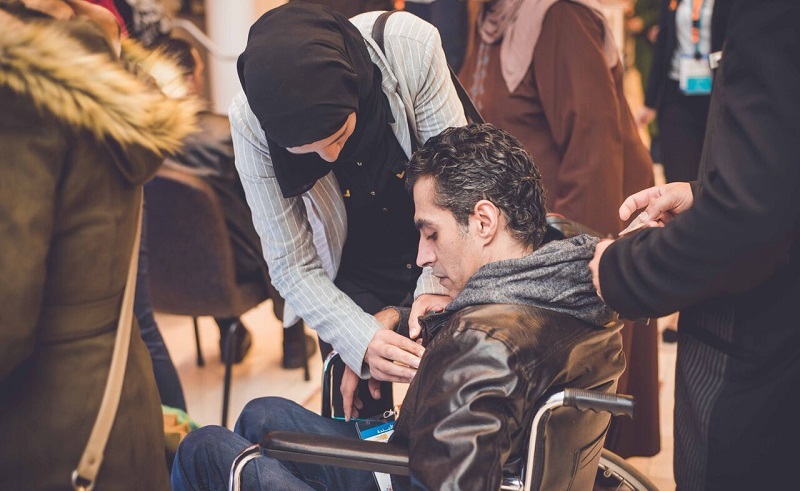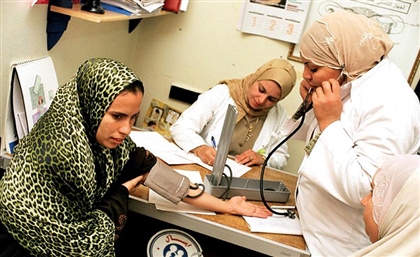Multiple Sclerosis: The Silent Chronic Disease Slowly Paralysing Egypt's Youth
More than 80% of Egyptian MS sufferers are unaware of their syndrome.

"My left leg was suddenly impossible to move, as if it was separate from my body," are the words 36-year-old Mohamed Aref used to describe his first Multiple Sclerosis (MS) attack some 10 years ago. A few anxious doctors' appointments later, Aref was diagnosed and put on treatment to halt the progress of the chronic demyelinating disease, which causes the body's immune system to attack the insulating covers of the nervous system, causing immense damage to one's ability to control their senses and motion.
After a few years of negligence on part of his doctor, Aref wasted valuable time not taking the proper medications for his condition, which caused his situation to quickly deteriorate before he sought assistance from MS Care Egypt, a local community of patients and specialised physicians which is aimed at containing and raising awareness on MS in the country. With it's motto being 'It's My Right', MS Care Egypt organised an event on December 8th for the community to get together with medical experts to discuss the disease's current status in Egypt, as well as what the future might hold for Egypt's MS patients. We caught up with them and talked to Aref and many others to find out more about the prominence of, as well as the stories associated with, the demyelinating disease in Egypt.  The causes of MS continue to remain unknown until today, making tackling the disease at its early stages or even detecting it before an attack occurs virtually impossible without a head MRI, which is usually suggested after years of misdiagnosis. Scientists believe it's a mix of environmental and genetic factors that contribute to increased vulnerability to MS, which usually attacks individuals aged 20-50. The symptoms are varied, and include double vision, blindness in one or both eyes, muscle weakness and loss of control over the spinal cord, which can progress into total paralysis if left untreated. "I got my first MS attack at 16 in my left eye. Three years after, I got another attack in both my legs, at which point I was finally diagnosed with MS and put on treatment," explained 22-year-old Tasneem, whose diagnosis came at the time when she had just gotten engaged.
The causes of MS continue to remain unknown until today, making tackling the disease at its early stages or even detecting it before an attack occurs virtually impossible without a head MRI, which is usually suggested after years of misdiagnosis. Scientists believe it's a mix of environmental and genetic factors that contribute to increased vulnerability to MS, which usually attacks individuals aged 20-50. The symptoms are varied, and include double vision, blindness in one or both eyes, muscle weakness and loss of control over the spinal cord, which can progress into total paralysis if left untreated. "I got my first MS attack at 16 in my left eye. Three years after, I got another attack in both my legs, at which point I was finally diagnosed with MS and put on treatment," explained 22-year-old Tasneem, whose diagnosis came at the time when she had just gotten engaged.
The causes of MS continue to remain unknown until today, making tackling the disease at its early stages or even detecting it before an attack occurs virtually impossible

Her loving fiancée, who is now her husband, was not scared away by the prospect of her illness. At this point, Tasneem is still in the early stages of the syndrome and she is receiving government-funded treatment, which - though not completely reliable - continues to keep her in a fairly good state. She can still walk without assistance, barely struggling with speech, and, most importantly, she has hopes for the future. "I really want to find work, which is very challenging for someone in my condition," said Tasneem as she explained how being unproductive is greatly affecting her mental well-being and contributing to increased depression, which the doctors identify as a particularly sensitive threat to MS patients.
I really want to find work, which is very challenging for someone in my condition
29-year-old patient Amir Ismail, however, has decided he won't be giving in to depression and self-pity. A year ago, Ismail was diagnosed, just like Tasneem, with Relapsing-remitting MS (RRMS), the more common and less damaging form of the disease. With the help of MS Care Egypt, Ismail has been taking a monthly shot which has helped to stabilise and even improve his condition. "I consider this to only be a little pause in my life, after which it will have to go on," smiling Ismail says. "I still have plans for the future and will continue to live my life the best way I possibly can," he adds.
For those suffering from the progressive forms of the disease, the equation is not that simple. While mostly shielded from the sudden attacks and relapses, the disease silently and slowly worsens their condition with no prior warning. Primary-progressive MS (PPMS), which 15 percent of MS patients worldwide suffer from, is usually detected at a later stage of life for the lack of a dramatic prior warning as is the case of RRMS. "It all started with me being suddenly unable to perform minor physical tasks at home and work in my capacity as an engineer," explains 46-year-old Sherine, who was moving around in a wheelchair with the assistance of her mother. "That was until the day I completely collapsed on my way to work, which is when I felt there's a real issue going on." Despite her relatively advanced level of disability, Sherine continues to go to work and has hope for a cure to surface. "What we take now is not real treatments. We try to minimise the symptoms and keep the disease from damaging further nerves, but a real cure is yet to appear," she elucidates.
What we take now is not real treatments. We try to minimise the symptoms and keep the disease from damaging further nerves
In March 2017, the US Food and Drug Association (FDA) approved the first and only disease-modifying drug for both relapsing and primary progressive forms of MS. Requiring only two shots a year, the new drug by Roche could greatly help keep the lifestyle of those with the disease relatively unchanged, which in itself is a leap forward for most MS patients and their loved ones. "This is an exciting day for everyone touched by MS, a disease that strikes in the prime of a person's life when she or he may be starting a career or family," said the Consortium for MS Centers' CEO June Halper following the FDA approval of Roche's new drug. "We have eagerly awaited the FDA approval of Ocrevus [the new drug's commercial name] because it not only offers a new, highly efficacious treatment option for people with RMS, but it's also the first disease-modifying therapy indicated for primary progressive multiple sclerosis. For many people living with MS, this FDA approval is a source of hope."
The chronic disease's effect doesn't just stop at its sufferers, their families and loved ones, for it costs the Egyptian economy alone more than a quarter billion Egyptian pounds in lost productivity due to MS-related disabilities. In Egypt, which happens to be the country with the highest MS rates in the MENA region, only 20 percent percent of MS patients are aware of their condition and are receiving the care they need. 50,000 Egyptians continue to suffer from the disease while completely oblivious to their condition, which is where the even more grave danger lies. "I'm always optimistic about the future. The thing about MS is that it targets youth, which I see as a positive thing as they tend to have higher hopes for recovery and carrying on with their lives," says Ain Shams Hospital's Assistant Professor in Neurology, Dina Abdel Gawad. "This is a generation which grew up with the technology, internet, and science. They are future-oriented and know how to keep themselves motivated and away from depression, which I believe helps create a better tomorrow for them," she concludes.
Pictures and Video captured at an event by MS Care Egypt on December 8th, 2017.
@MO4Network's #MO4Productions
- Previous Article These are Netflix's 2017 Most Watched Shows in Egypt
- Next Article Meet the Egyptian Filmmaker Behind Our First Indie Feature in Cannes
























